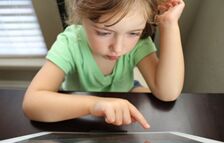让屏幕代替父母陪孩子?世卫组织:这样是不对的!
|
宝宝吵闹的时候,自己暂时有事要忙的时候,有些家长可能会给孩子塞个手机或平板电脑,让宝宝玩会儿游戏或看动画片。 近日,世界卫生组织对此提出建议,两岁以下的婴幼儿不要看电视和其他屏幕,两岁到四岁的幼童每天看电视不要超过一个小时。 对此,有些家长表示,真的很难做到啊......
Babies and toddlers should not be left to passively watch TV or other screens, according to new World Health Organization guidelines. 根据世界卫生组织新发布的指导方针,不应该让婴幼儿被动地看电视或其他屏幕。 Sedentary screen time, including computer games, should not happen before a child is two, the WHO says. 世界卫生组织称,两岁以下的幼儿不能久坐不动地看屏幕,包括玩电脑游戏。 sedentary ['sed(ə)ntəri]: adj.需要久坐的;惯于久坐不动的
The limit for two- to four-year-olds is an hour a day and less is better. 两岁到四岁的幼童每天看屏幕的时间最好不要超过一个小时。 The new WHO advice focuses on passive viewing - youngsters being placed in front of a TV or computer screen or handed a tablet or mobile phone for entertainment - and is aimed at tackling child inactivity, a leading risk factor for global mortality and obesity-related ill health. 世界卫生组织的新指导意见主要关注被动看屏幕的现象——小孩被放在电视机或电脑前,或让孩子玩平板电脑或手机,该指导意见的目标是解决儿童缺乏活动的问题,活动量不足是造成全球死亡和肥胖相关疾病的首要风险因素。 It is the first time the WHO has made recommendations on physical activity, sedentary behavior and sleep for children under five. 这是世界卫生组织首次对五岁以下儿童的身体活动、久坐行为和睡眠提出建议。 As well as warning against passive screen time, it says babies should not spend longer than an hour at a time strapped into a buggy, car seat or sling. 除了对被动屏幕时间提出警告,世界卫生组织还指出,宝宝坐在婴儿车(童车)、车座或背带上的时间一次不能超过一个小时。 buggy['bʌɡi]: n. 童车
具体建议如下: For babies: Be physically active several times a day, including at least 30 minutes' "tummy time" - lying on their front No sedentary screen time 14-17 hours' sleep a day, including naps, for newborns - reducing to 12-16 by four to 11 months Should not be restrained (ie strapped into a recliner, seat or sling) for more than an hour at a time
For one- and two-year-olds: At least three hours' physical activity a day No sedentary screen time for one-year-olds and less than an hour for two-year-olds 11-14 hours' sleep a day, including naps Should not be restrained for more than an hour at a time or sit for extended periods of time
For three- and four-year-olds: At least three hours' physical activity a day, including at least one of moderate or vigorous intensity Up to an hour of sedentary screen time - less is better 10-13 hours' sleep a day, which may include a nap Should not be restrained for more than an hour at a time or sit for extended periods of time
The WHO advice is based on available evidence, but there is still a lack of definitive research into the harms and possible benefits of screen use. 世界卫生组织的建议是基于能获得的证据,但对于屏幕使用的危害和潜在的益处还没有确切的研究结果。 However, it was unlikely very young children gained from passive, sedentary viewing, said one of the guideline authors, Dr Juana Willumsen. 但是,指导方针的作者之一胡安娜·维卢姆森博士说,太小的孩子不太可能从被动、久坐的屏幕时间获益。 "Children need to be given opportunities throughout the day to actively play and we should be reducing sedentary, passive screen time," she said. 她说:“应该让孩子有机会在一天中活跃地玩耍,减少久坐、被动的屏幕时间。”
其他专家怎么说? In the US, experts say children should not use screens before they are 18 months old. 在美国,专家称孩子在满18个月之前都不能看屏幕。 In Canada, screen time for children younger than two is not recommended. 在加拿大,两岁以下幼童不建议看屏幕。 Dr Max Davie, from the RCPCH, said: "The restricted screen time limits suggested by the WHO do not seem proportionate to the potential harm. 英国皇家儿科医学院的麦克斯·戴维医生说:“世界卫生组织建议的屏幕时间限制和看屏幕的潜在危害似乎不成比例。” "Our research has shown that currently there is not strong enough evidence to support the setting of screen time limits. " “我们的研究显示,目前没有强有力的证据足以支持世卫组织提出的屏幕时间限制。”
父母们能做什么? Paula Morton, a teacher and mother of two young children, said her son learned a lot from watching programs about dinosaurs and came out with "random facts about them". 宝拉·莫尔顿是一名老师,也是两个小孩的母亲,她说她的儿子从观看恐龙节目中学到了很多东西,了解到了关于恐龙的一些冷知识。 random fact: 冷知识
"He doesn't just sit there and zone out," she said. "He's obviously thinking and using his brain. 她说:“他并不是坐在那里脑袋空空。他显然是在动脑筋思考。 zone out: 头脑空白,走神
"I don't know how I would make the dinner, cook and clean if he didn't have something to watch." “如果不让他看点什么,我不知道我要怎么做饭和打扫。”
英国皇家儿科医学院建议父母可以问自己以下这几个问题: Is screen time controlled? Does screen use interfere with what your family want to do? Does screen use interfere with sleep? Are you able to control snacking during screen time?
If a family are satisfied with their answers to these questions, then they are likely to be handling screen time well, the college says. 学院表示,如果对于这些问题一个家庭能给出满意的答案,那他们就能妥善处理屏幕时间的问题。 |









